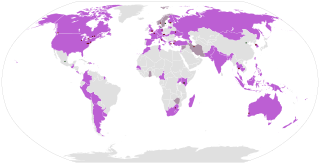
The International Council of Women (ICW) is a women's organization working across national boundaries for the common cause of advocating human rights for women. In March and April 1888, women leaders came together in Washington D.C., with 80 speakers and 49 delegates representing 53 women's organizations from 9 countries: Canada, the United States, Ireland, India, United Kingdom, Finland, Denmark, France and Norway. Women from professional organizations, trade unions, arts groups and benevolent societies participate. National councils are affiliated to the ICW and thus make themselves heard at the international level. The ICW enjoys consultative status with the United Nations and its Permanent Representatives to ECOSOC, ILO, FAO, WHO, UNDP, UNEP, UNESCO, UNICEF, UNCTAD, and UNIDO.

Isabelle Laure Gatti de Gamond was a Belgian educationalist, feminist, and politician.

Marie Popelin was a Belgian jurist and early feminist political campaigner. Popelin worked with Isabelle Gatti de Gamond in the development of women's education and, in 1888, became the first Belgian woman to receive a doctorate in law. After her accession to the bar was refused, Popelin went on to have an active career as the leader of the Belgian League for Women's Rights. She died in 1913 without ever gaining admission to the bar.
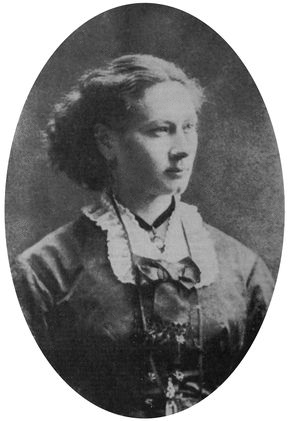
Isala Van Diest was the first female medical doctor and the first female university graduate in Belgium.
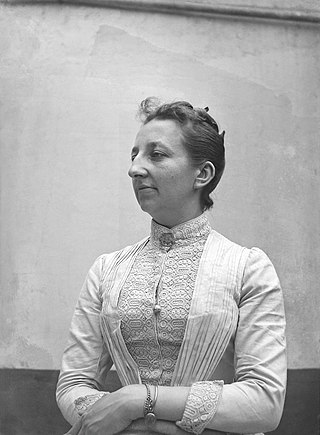
Léonie La Fontaine was a Belgian pioneering feminist and pacifist. Active in the international feminism struggle, she was a member of the Belgian League for the Rights of Women, the National Belgian Women Council and the Belgian’s Women's International League for Peace and Freedom. Her brother was Henri La Fontaine, Belgian international lawyer and president of the International Peace Bureau who received the Nobel Prize for Peace in 1913, and was also an early advocate for women's rights and suffrage, founding in 1890 the Belgian League for the Rights of Women.

The National Council of French Women is a society formed in 1901 to promote women's rights. The first members were mainly prosperous women who believed in using non-violent means to obtain rights by presenting the justice of the cause. Issues in the first half century included the right to vote, legal equality between husband and wife, paternal child support, social support for children, equal employment opportunity, equal pay for equal work and acquisition of citizenship on marriage. The National Council of French Women is affiliated with the International Council of Women (ICW). Now the oldest of French feminist organizations, it continues to work for causes related to the rights of women.

Barbe-Henriette Dieudonnée Dachsbeck was a Belgian educator and feminist who was instrumental in the development of women's education in Belgium at the end of the nineteenth century.

The Isabelle Gatti de Gamond Royal Atheneum is a French-speaking K-12 school located in Brussels, Belgium. When founded in 1864 by Isabelle Gatti de Gamond, the school was the first non-confessional school for girls in Belgium.
Louise van den Plas was a Belgian suffragist and the founder of the first Christian feminist movement in Belgium.
Marie Parent (1853–1934) was a Belgian journal editor, temperance activist, feminist and suffragist. She founded the Alliance des femmes contre les abus de l'alcool in 1905 and the Ligue belge des femmes rationalistes in 1920. For over 20 years, she headed and edited the Journal des Mères, for which she received the Adelson Castiau award from the Royal Academy of Belgium and a gold medal at the 1910 Brussels International Exhibition.

The Conseil National des Femmes Belges, or National Council of Belgian Women, is the name of a Belgian women's organization which was founded in 1905 as the Belgian chapter of the International Council of Women (ICW). Over the years, the organization succeeded in supporting the emancipation of women in a wide range of interests until its mandate was limited to French-speaking Belgian women in 1974. In 1990, the name was changed to Conseil des Femmes Francophones de Belgique.
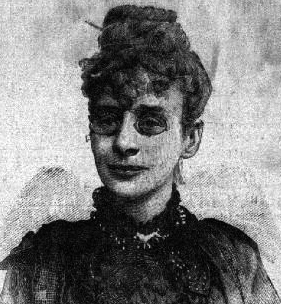
Marie-Rose Astié de Valsayre was a French violinist, feminist, nurse and writer, who is remembered for attempting to overturn legislation prohibiting women from wearing trousers and for a fencing duel she had with an American woman. After studying medicine, she had provided emergency services during the Franco-Prussian War in 1870. In 1889, she created the Ligue de l'Affranchissement des femmes calling for women to be added to the electoral lists.
Emma Leclercq was a Belgian cell biologist and feminist lecturer. She was known for being the first female student and graduate from Université libre de Bruxelles, and the first female doctorate earner from Ghent University.
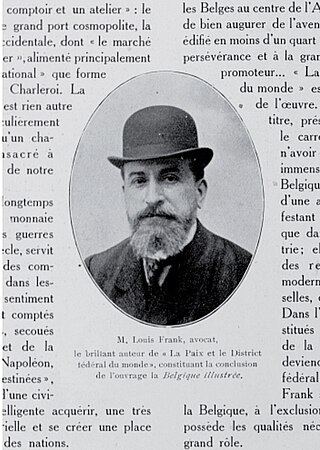
Louis Frank was a Belgian lawyer, philosopher and pioneer of the Belgian feminist movement.

Jeanne Augusta Félicienne Beeckman was a Belgian medical doctor, socialist, feminist, and anti-fascist.
Louise Popelin (1850–1937) was a Belgian pharmacist.

Eugénie Hamer was a Belgian journalist, writer and activist. Her father and brother served in the Belgian military, but she was a committed pacifist. Involved in literary and women's social reform activities, she became one of the founders of the Alliance Belge pour la Paix par l'Éducation in 1906. The organization was founded in the belief that education, political neutrality, and women's suffrage were necessary components to peace. She was a participant in the 18th Universal Peace Congress held in Stockholm in 1910, the First National Peace Congress of Belgium held in 1913, and the Hague Conference of the International Congress of Women held in the Netherlands in 1915. This led to the creation of the International Committee of Women for Permanent Peace, subsequently known as the Women's International League for Peace and Freedom (WILPF). Hamer co-founded the Belgian chapter of the WILPF that same year. During World War I, she volunteered as a nurse and raised funds to acquire medical supplies and create an ambulance service.
Éliane Gubin is a Belgian historian, researcher and professor of political and social history, specializing in the history of women and feminism. In the late 1980s, she initiated the introduction of women's history at the Université libre de Bruxelles (ULB), where she is professor emerita. She also teaches the history of contemporary Belgium and specializes in social history and political history of the nineteenth century and the first half of the twentieth century, including a re-reading of the World War I. Since 1995, she has been co-director of the Centre d'archives pour l'histoire des femmes.

Joséphine Nyssens Keelhoff (1833–1917) was a Belgian activist and social reformer identified with the temperance, feminist, and women's rights movements. She was also an editor of publications that supported her activities. Her struggle for temperance social reform included classic propaganda means for the time: organs, brochures, and conferences. Keelhoff wrote articles for the Union des femmes belges contre l'alcoolisme 's organs: L'Action sociale first, La Clairière, and Het Geluk des Huisgezins, financing these publications itself. Her death was a severe loss to the temperance movement in Belgium.













